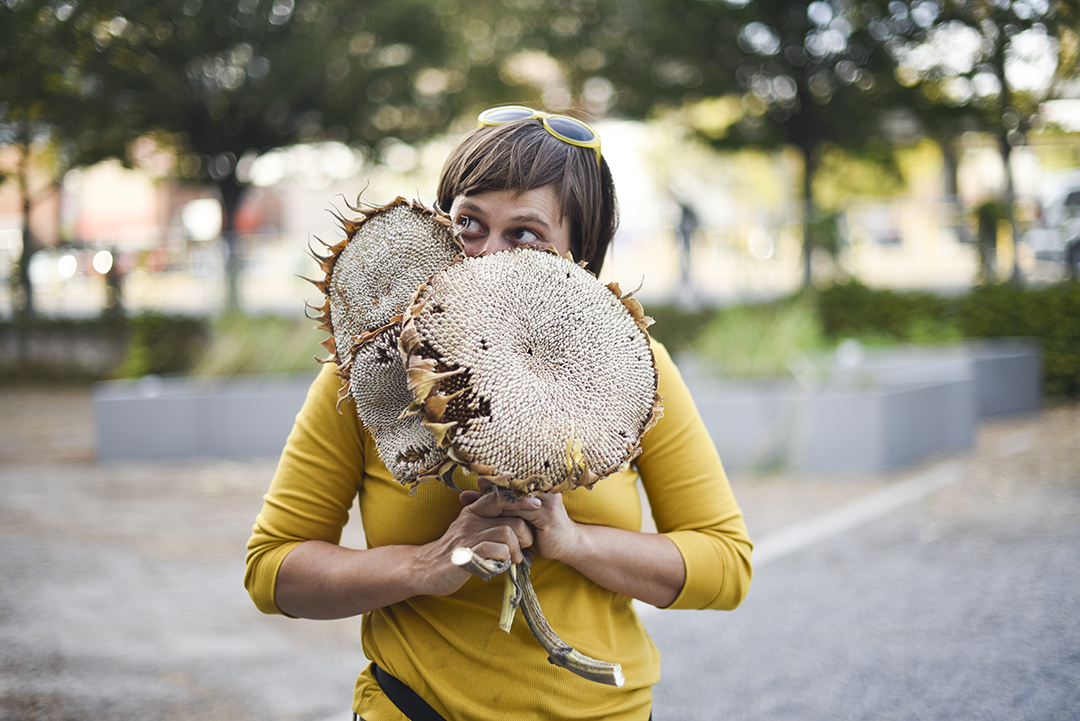By Amy Banks
Many Utah librarians currently offer nature resources, but Salt Lake City Public Library has a specific librarian assigned to facilitating seed libraries and garden spaces. Rikki Longino shares vital knowledge about nature, seeds, and gardening outreach. Rikki started this nature library work two years before their position became official, as they created the first seed library in 2018 as a physical catalog at the Main Library. It saw a lot of use, so Rikki applied for the garden associate position, but on their first official day on the job, the library shut down due to the pandemic.
With many people starting pandemic backyard gardens, the library received thousands of orders. Rikki digitized the seed library and started up a seed mail-order program that helped fulfill the demand from Salt Lake patrons. Rikki wrangled thousands of seeds, many donated from True Leaf Market, a large distributor based here in Salt Lake City, which helped to focus on local seeds.
When libraries began to slowly reopen, Rikki was determined to get every Salt Lake City branch to have their own seed library. That vision is now a reality as you can check out seeds from every branch. Patrons are encouraged to fill out an online form or physical form to track how many seeds are being shared. Patrons also have the option to sign up for an email newsletter when checking out seeds, and this newsletter now has 6,000 members. As a final step in the seed cycle, patrons are encouraged to return and share their seeds after harvest, to further local seed knowledge.

Rough estimates suggest that about 1000 seed packets are shared a month throughout the Salt Lake City Public Library system.
The newest Salt Lake City seed library can be found at the Sweet Branch. It was created in a partnership with the Greater Avenues Council, built as a piece of custom hardwood furniture. The Glendale Seed Library also pairs their seed offerings with a tea library in the wintertime, so patrons can check out different blends of tea along with their seeds.


Rikki sees seed libraries as preserving archives that curate locally adapted seeds and native seeds that are important to the community. It is particularly important to preserve and share seeds as “Every year a seed is growing, it is gaining new knowledge, like how to adjust to its climate and adapt to the rapidly changing climate.” Chatting with Rikki about seeds can often feel like poetry in action, as they assert that:
“Seed libraries have a great potential to be sites of storytelling and life preserving through adversity.”
Rikki Longino
If your library or neighborhood is thinking of starting a seed library, Rikki recommends some key steps:
- Foster community buy-in by delegating tasks with your team.
- Seed packing can be an ordeal, especially as many seed libraries lack an experienced botanist. So be sure to advertise and announce your seed library, seeking volunteers to organize and maintain the resource.
- Form community connections, like inviting youth groups “to pack seeds as joyful work.”
Share the mindfulness of gardening, as Rikki explains that seed library work can be time to process emotions and be absent from mechanization, to connect with the joy of finding a deep place in yourself.
Rikki also manages eighteen beds in The Plot at the Main Library. These beds are rented out to community members free from the library, as individuals commit to growing and completing a couple hours of service a month in the plot. Rikki organizes a Garden Fundamentals series, taught by local gardening talent, with classes like mycology, flower arranging, and composting. They also offer a perennial Gardening and Pizza event for patrons that utilize social services through the library. Rikki additionally collaborates with the Children’s department to offer garden storytimes. The Children’s team has their own garden box where they have planted herbs like peppermint and made peppermint tea for children visiting the library.

For some practical gardening tips, Rikki reminds everyone going into spring planting to remember some key elements:
- Start with your soil, as principles of soil health keep living roots growing.
- Add compost to your garden.
- Encourage soil diversity with worms and insects.
Rikki discourages gardeners from breaking up or aerating the soil too much, as that can disrupt the mycelium networks of interconnected life in the soil. The more compost and organic matter you can add, the more likely your plants will do well.
As reassurance, Rikki reminds you to seed heavily, with the beautiful adage, “If you lose a crop, see it as an opportunity for something else to grow.” You will likely see more plants die than grow, so don’t expect everything to grow. But you can try to nurture your seeds, and it is smart to have a nice backup of seeds to try.
Rikki emphasizes that the possibilities for gardening and nature in libraries are endless, with the encouragement, “If you don’t have a garden at your library, you should get one.” Nature resources can be relevant to every library department and every aspect of life in your community.
Let us know if you start a seed library or nature resource at your library! Connect with us on Instagram and Facebook.

